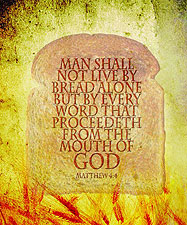“Peter, you’d better explain yourself.” Well, I can better paraphrase the text as “Man shall not live by Praise and Worship alone.” I want to emphasize the truth as applicable to today’s expression of the church. In fact, you could replace any object and the truth that follows would still be valid.
The quote is based on the words Jesus found in both Matthew 4:4 and Luke 4:4 — “Man shall not live by bread alone, but by every word that comes from the mouth of God” (ESV). And Jesus was quoting from the Old Testament book of Deuteronomy 8:3, so the truth has been applicable for millenniums! The Message Bible reads, “It takes more than bread to stay alive. It takes a steady stream of words from God’s mouth.”
So why mention Praise and Worship? I’m not against that trend, and there are some good songs that have emerged from the thousands, like “Shout to the Lord” and “Hear I Am, Lord.” What does concern me is the time balance between Praise and Worship and the teaching of God’s Word. I’ve been in churches where a 15-20 minute message was only heard after more than an hour’s worth of spectator worship, and it obviously was not the highlight of the occasion. A cold snack on Sunday morning is not enough to get believers through another seven days!
I read this interesting statement in an article “Are Worship Songs an Idol in Modern Churches?” The author wrote, “I enjoy them. I like singing them. But when it comes to worship, I feel like we tend to worship them… I’m calling worship leaders to more of the real thing. Maybe we need to lead less worship and learn how to read our Bibles again” (David Santistevan, a worship pastor Ministry Today Report October 6, 2017). Two amens to that, David!
 It has been and always will be that without the Word of God taught faithfully and believed implicitly humans have no foundation for victorious living in a hostile world. This is true from the Garden of Eden onwards. In the temptation of Eve, Satan said, “Has God said?…” He was questioning the integrity of God’s Word and to this day people still question it or do not totally believe it.
It has been and always will be that without the Word of God taught faithfully and believed implicitly humans have no foundation for victorious living in a hostile world. This is true from the Garden of Eden onwards. In the temptation of Eve, Satan said, “Has God said?…” He was questioning the integrity of God’s Word and to this day people still question it or do not totally believe it.
The first part of the verse in the heading of this newsletter reads, “Your words were found, and I ate them…” — “they were as welcome to him as food is to a hungry man; he cheerfully received them, treasured them up in his memory, digested them in his mind, and carefully retained them” (John Gill).
Jesus taught his disciples that “The words that I have spoken to you are spirit and life“ (John 6:63b). The rapid growth of the early church was because the apostles “spoke the word of God with boldness” (Acts 4:31); “Now those who were scattered went about preaching the word” (Acts 8:4). “The next Sabbath almost the whole city gathered to hear the word of the Lord” (Acts 12:24). There is hardly any mention of singing songs or psalms in Acts but many records of God’s Word being preached, believed, and acted upon.
This is why E.W. Kenyon wrote: “Here are some facts about the Word these men preached. It ruled their private lives. It was magnified. It increased; it grew, a living Power. It multiplied. Men were mastered by the Word. Men proclaimed the Word. Men gathered to hear the Word… The Word alone gave faith. The Word alone gave the New Birth. The Word alone gave healing. The Word alone bound the disciples together. That spoken Word that we see in the Book of Acts was the manna of God for the recreated human spirit. It still is.” (from Advanced Bible Studies, Lesson 27).
Paul wrote to the Corinthians, “I fed you with milk, not solid food, for you were not ready for it. And even now you are not yet ready” (I Corinthians 3:2). The writer to the Hebrews penned, “You have become dull of hearing. For though by this time you ought to be teachers, you need someone to teach you again the basic principles of the oracles of God [the ABCs]. You need milk, not solid food, for everyone who lives on milk is unskilled in the word of righteousness, since he is a child. But solid food is for the mature” (Hebrews 5:11b-14a).
What do we see from all this? The Word was central in the early church. While it had not started to be written down until near the end of the Book of Acts, the disciples faithfully and boldly proclaimed what Jesus had taught, they majored on the resurrection of Jesus, and they ministered by the authority of his name. We now have the complete “New Testament” but the Word is no longer central to most churches or most believers.
To survive the coming storm, we will need to absolutely know that Christ is in us and we are in him, not the latest worship song. Start reinforcing these truths into your minds by reading, studying and understanding God’s precious and powerful Word. “By your words I can see where I’m going; they throw a beam of light on my dark path” (Psalm 119:105 MSG). — Peter Wade.



Great words! Thanks Peter